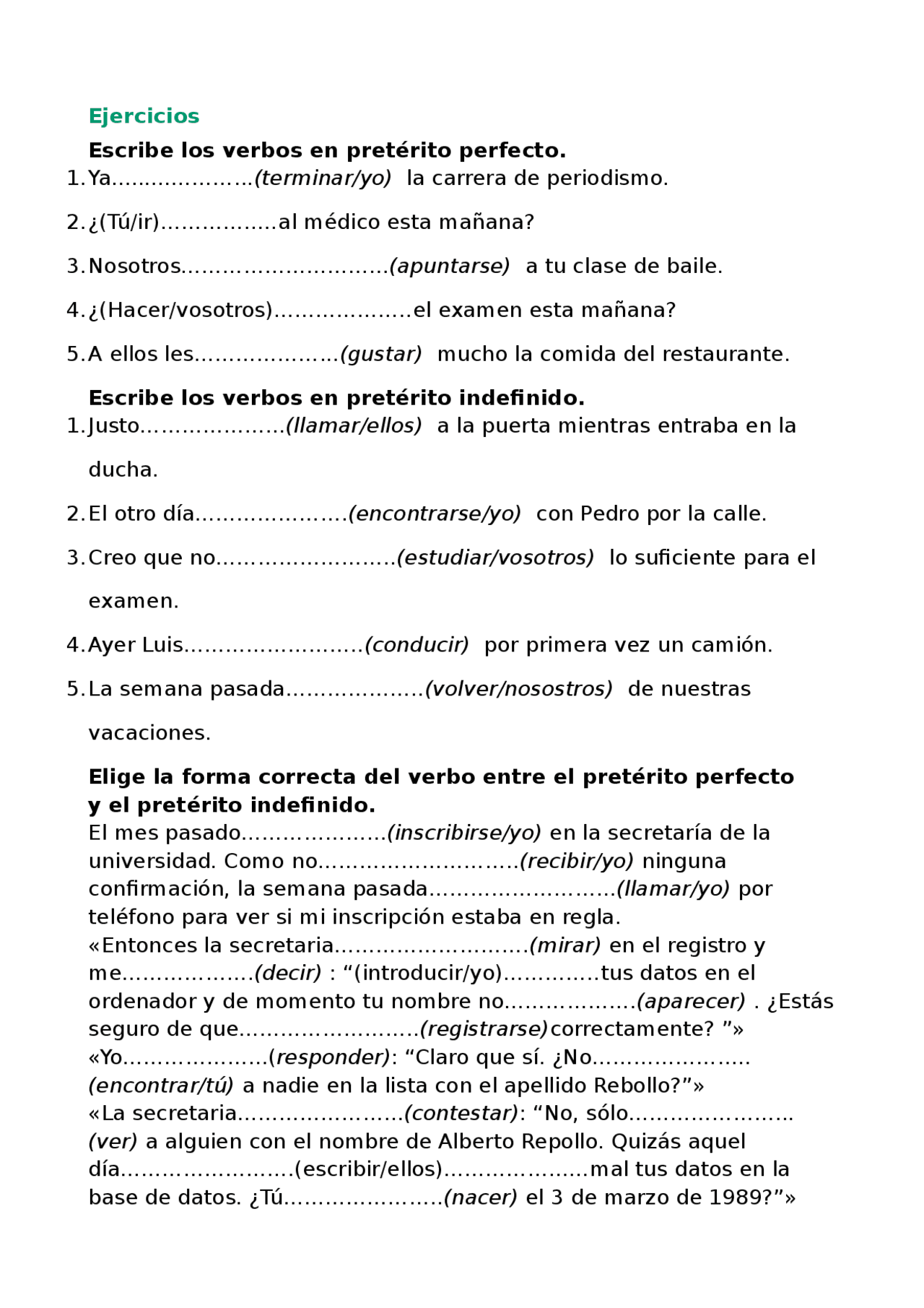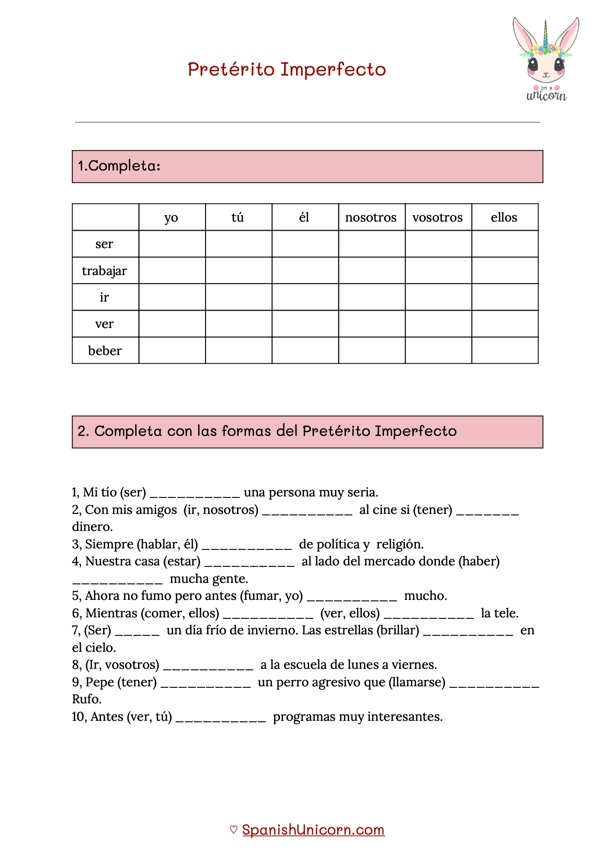Español » Pretérito perfecto (esercizi e schede)

El pretérito imperfecto de indicativo en español Spanish Via Skype
Preterito perfecto Preterito perfecto. Loading ad. Cesar Teranc. Member for 3 years Age: 12+ Level: 9. Language: Spanish (es) ID: 644274. 19/01/2021. Country code: SE. Country: Sweden. School subject: Spanska (1059152) Main content: Preteritum (1249293) Entrenar el perfecto. Other contents: perfekt particip.

Pretérito Pluscuamperfecto ejercicios de gramática Ejercicios de
Spanish Preterite Perfect Tense. The preterite perfect tense ( el pretérito anterior o el antepretérito) is primarily used formally or literarily (in written texts). It describes an action in the past that happened immediately before another action in the past.

Ejercicio de Pretérito perfecto e imperfecto. Spanish worksheets, 2nd
7. El verano pasado (dedicarse/ella) a la pintura. 8. Jamás (conocer/yo) a una persona tan extraña. 9. Como ayer hacía mucho calor, (ir/nosotros) a bañarnos a la piscina. 10. Todavía no (terminar/yo) la carrera. End of the free exercise to learn Spanish: Pretérito perfecto/indefinido.

Esercizi preterito perfecto e indefinido spagnolo Docsity
Welcome to our past tense quiz! When learning Spanish, it can be hard to distinguish between the different uses of the past tense. Our quiz will help you use correctly and identify "el pretérito perfecto" and "el pretérito indefinido". Practise the past tense and improve your Spanish, TODAY!

Preterito Perfecto Learning spanish, Teaching spanish, Spanish
Our offer. Private lessons Group lessons Tutoring Companies. The pretérito perfecto simple is a form of the verb that is used to talk about actions that were completed in the past in Spanish. It often corresponds to the simple past in English, as in I bought a new bike (compré una bicicleta nueva).

Esercizi sul Pretérito perfecto e Indefinido / Passato prossimo e
Exercise A1. Regular verbs. Type in the verbs in the perfect tense. ¿Qué nota (sacar/tú) en el examen? ¿ (comer/vosotros) ya? Me (tocar) unas entradas para el cine. El árbitro (pitar) el final del primer tiempo. Irregular verbs. Type in the verbs in the perfect tense.

preterito indefinido ejercicios pdf
7. Él (ganar) un premio. 8. Mis padres (volver) al pueblo y están muy contentos. 9. Yo (empezar) un nuevo trabajo. 10. Mi marido y yo (cambiar) de casa. End of the free exercise to learn Spanish: Pretérito perfecto. A free Spanish exercise to learn Spanish.

25 frases para practicar el pretérito pluscuamperfecto La página del
Complete the sentences with the pretérito indefinido of the verbs in brackets.. Justo (llamar/ellos) a la puerta mientras entraba en la ducha. [They rang the doorbell just as I was getting in the shower.]|regular -ar verb|3rd person plural → -aron El otro día (encontrarse/yo) con Pedro por la calle. [The other day I bumped into Pedro on the street.]|regular reflexive -ar verb|1st person.

ejercicios preterito indefinido e imperfecto pdf
A2 - Elementary: Pretérito Perfecto Simple. Exercise 1 Exercise 2 Exercise 3 Exercise 4 Exercise 5 Exercise 6 Exercise 7 Exercise 8 Exercise 9 Exercise 10 Exercise 11 Exercise 12. Study Spanish Online Live Lessons via Zoom. Study with a private tutor online. More Info. AMAUTA Spanish School Carmen Bajo 224, Cusco

preteritoperfectoinfografia … Spanish teaching resources, Spanish
Use of pretérito perfecto. The pretérito perfecto is similar in nature to the English present perfect tense. It is used to describe: actions in the past that have been recently completed. actions in the past that started in the past and are still continuing or seen as the present. completed actions that influence the present or future.

De pretérito perfecto & indefinido Espaans Blog
To form pretérito perfecto we conjugate haber in the present tense and we add the past participle (participio pasado). The past participle is formed by taking the infinitive, removing the -ar, -er, -ir and adding the endings -ado, -ido, -ido, respectively. Spanish pretérito perfecto regular conjugation. Keep in mind that the past participle.

Pretérito Perfecto EJERCICIOS descarga en pdf Pretérito perfecto
The Spanish preterite perfect (el pretérito perfecto) is an indicative tense that expresses a completed action that occurred within an unfinished or ongoing time period: e.g. hoy (= today), esta semana (= this week), este año (= this year). This tense is similar in meaning to the English present perfect tense (have done, have asked, have seen.

Durante Gastos Feudal marcadores temporales preterito perfecto Suelto
Exercises. Choose the correct form of the present perfect subjunctive. Verás la tele cuando. haya recogido hayas recogido hayamos recogido. la habitación. [You can watch television once you've tidied your room.]|2 nd person singular → hayas recogido. No creo que tu primo y tú. hayas hecho hayamos hecho hayáis hecho. algo mal.

indefinido e imperfecto ejercicios Spanish worksheets, Teaching
Un tiempo "perfecto" representa hechos que se consideran completos dentro de un marco de tiempo finito.El hecho se percibe después de que ocurrió, desde fuera, como un proceso terminado "allá" en el pasado: La fiesta terminó a las doce de la noche. Estuvo buenísima. (estamos "fuera" del hecho ya completo) A "perfect" tense reports events viewed as completed within a finite time frame.

Esercizi Spagnolo preterito perfecto e indefinido PDF Soluzioni
Participios regulares e irregulares 2. Participios irregulares - escribe. Pretérito perfecto compuesto. Verbos en pretérito perfecto - ejercicios. El presente perfecto - ejercicios. Pretérito perfecto - ordenar las palabras. Pretérito perfecto - participios irregulares. Pretérito perfecto - ejercicios. El pretérito perfecto.

Pretérito perfecto usi ed esercizi Esercizi di Spagnolo Docsity
Verbos irregulares. Conjuga los verbos entre paréntesis en pretérito perfecto.. El grupo (volver) de su gira americana. Verbo haber 3ª persona del singular + participio irregular con cambio vocálico en la raíz -o-→-ue-; Te (decir/yo) cien veces que vengas. Verbo haber 1º persona del singular + participio irregular: decir → dicho; Esta mañana no (hacer/nosotros) las camas.